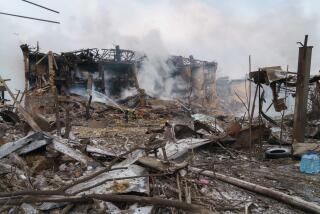U.S. no-fly list criticized after attempted plane bombing
Reporting from Washington — The federal government’s no-fly list has come under intense scrutiny from congressional leaders and President Obama after last week’s attempted bombing aboard a Northwest Airlines flight bound for Detroit.
The list is intended to keep known or suspected terrorists from boarding airplanes within or headed for the United States. It includes about 3,400 people, roughly 170 of them U.S. residents.
Umar Farouk Abdulmutallab, the Nigerian man accused of trying to detonate an explosive on Flight 253 on Christmas Day, was listed on a broader database of about half a million names.
Obama has criticized the intelligence community for not piecing together tips about Abdulmutallab, which the president said should have landed him on the no-fly list and thwarted his attack.
In a letter to Obama on Wednesday, Sen. Dianne Feinstein (D-Calif.) said Abdulmutallab had not been placed on the no-fly list because of a policy adopted last year under President George W. Bush that “limits the circumstances under which the government adds an individual to the watch list.”
That policy, Feinstein said, “is too restrictive and should be changed. The U.S. government should watch-list, and deny visas to, anyone who is reasonably believed to be affiliated with, part of, or acting on behalf of a terrorist organization.”
Obama has ordered a review of federal terrorism watch-list procedures, which is due to be delivered today.
The process of landing on the no-fly list begins with tips from the CIA, FBI and other intelligence agencies.
Some of that information is “extremely vague” and can be contradictory or unverified, said a U.S. intelligence official who requested anonymity because of the sensitivity of the matter. Other tips are specific and “much more useful as you try to understand events and individuals,” the official said.
People identified through those tips are entered into the Terrorist Identities Datamart Environment database of about 550,000 people. This is where Abdulmutallab was listed.
Federal counter-terrorism officials scrutinize those names and whittle them to a “consolidated terrorist watch list” of approximately 400,000 people worldwide. This designation means there is enough information to justify a “reasonable suspicion” that the person may be preparing to engage in terrorist activities.
But about 14,000 people on that watch list -- whom officials have placed on a “selectee” list because they meet a far more restrictive standard of potential threat -- automatically trigger additional screening beyond normal procedures at airports.
An additional 3,400 from the consolidated watch list are on the no-fly list because they “present a threat to civil aviation or national security,” Timothy J. Healy, director of the FBI’s Terrorist Screening Center, told a congressional committee this month.
Abdulmutallab should have made the list, Obama and others said, based on warnings from Abdulmutallab’s father -- who told U.S. officials that his son had developed extremist views -- and other bits of intelligence that pointed to a possible threat.
The list is only one tool in the effort to screen out potential terrorists.
Dutch and Nigerian officials, for example, said Wednesday that they would begin using advanced body screening machines on airline passengers. And U.S.-bound travelers this week faced pat-down searches in Paris and other overseas airports.
The no-fly designation has drawn criticism and constitutional challenges from civil liberties groups that question its accuracy and potential “false positives” -- people who pose no terrorist threat but are nevertheless barred from flying because, for example, their names happen to be the same as suspected terrorists.
In a statement Wednesday, the American Civil Liberties Union said the no-fly process must be seriously revamped.
“While it’s important to react quickly” to attempted terrorist attacks, “it’s also important to react wisely and to adopt procedures that will be both truly effective and the least invasive to Americans’ privacy,” said Michael German of the ACLU’s Washington legislative office.
“Electronic strip-searching of innocent people, racial profiling and bloated, poorly managed terrorist watch lists do not stop terrorist attacks,” the statement said, “but they do infringe upon Americans’ rights and waste valuable resources.”
More to Read
Sign up for Essential California
The most important California stories and recommendations in your inbox every morning.
You may occasionally receive promotional content from the Los Angeles Times.










